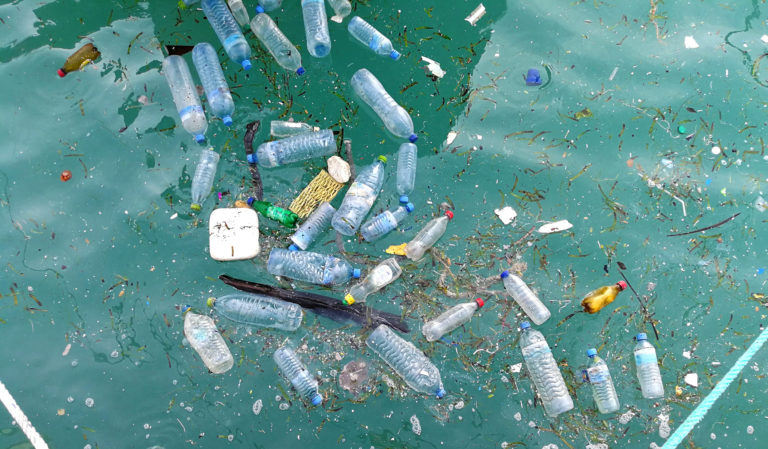Plastic Free July: Thinking beyond litter, landfills, and recycling rates
By: Thomas Hynes

Plastic Free July is a global movement for cleaner streets, oceans, and communities. Waterkeeper Alliance salutes our partners and all those fighting back against the tidal wave of plastic pollution in our oceans, waterways, and communities.
Plastic is so ubiquitous in our lives. It’s in our cars, at the grocery store, even in our clothes. Plastic’s presence goes way beyond our everyday lives. In fact, plastic will outlast us all, remaining in our ecosystem for generations.
Plastic is particularly harmful to our oceans and waterways. Microplastic in particular gets absorbed into the food chain, and before long it finds its way to our dinner table. Put another way, plastic doesn’t break down, it breaks apart into minuscule, yet still very dangerous particulates. One estimate says that the average person eats a credit card’s worth of plastic every week. By 2050, the ocean is expected to contain, by weight, more plastic than fish.
As for the plastic that doesn’t end up in the ocean, the story isn’t much better. It’s either burnt, often in frontline communities that bear the brunt in their lungs, or it’s sent to a landfill, which comes with its own host of problems.
It may help us to think beyond litter, landfills or recycling rates and think of plastic for what it is: a dangerous petrochemical derived from the fossil fuel industry. Plastic pollution is not just an aesthetic issue. It’s a slow motion oil spill that does great harm to our environment.
Despite the proliferation of recycling bins, the vast majority of plastic material is not recycled. In fact, less than ten percent of plastic gets recycled. That figure is alarming enough. But the problem is going to get a lot worse — and quickly — before it gets better. For one, plastic production is expected to quadruple by 2050. At the same time, what markets that do exist for plastic recycling are beginning to contract. China no longer accepts American plastic for recycling. Other countries are accepting our plastic pollution… for now.
“Yet, despite what the plastic industry has preached for decades through its advertising and public relations campaigns, the overall problem is not the littering individual.”
Recent efforts to incentivize ‘chemical recycling’ simply offer false solutions to both the plastic pollution and climate crises, as they still require refining, create toxic emissions, and do not sequester carbon. These technologies do not offer effective solutions and may only benefit the plastic industry’s messaging campaigns.
This also underscores an underlying truth: recycling alone will not solve this crisis. And yet, that’s what the public has constantly been told: that plastic waste is their responsibility. Anti-litter campaigns and paper straw initiatives have long shifted the onus away from the producers, allowing the petrochemical industry to continue its plastic production in spite of growing awareness of the consequences.
Yet, despite what the plastic industry has preached for decades through its advertising and public relations campaigns, the overall problem is not the littering individual. We should all manage our waste responsibly, but the source of the problem is with a plastic industry that mass produces a product that cannot realistically be recycled or otherwise disposed of under current conditions.
Instead, the burden of plastic pollution must be refocused on the industries that create the waste to begin with. The notion of ‘extended producer responsibility’ or ‘polluter pays’ models reframe the conversation about who should be accountable for this problem. Similarly, the far-reaching Break Free From Plastic Pollution Act currently before the US Congress would go a long way toward eliminating single-use plastic products and block permitting for new plastic production facilities until the pollution risks are better understood and mitigated.
Recycling and individual waste reduction efforts alone will not solve this problem. We need to do so much more. That’s why we stand in solidarity with our partners during Plastic Free July. We call on our leaders to understand the seriousness of this issue before us, and make real changes that transition our current waste-driven economy to one that is truly sustainable.
Here are actions you can take to support Plastic Free July: contact your Members of Congress (U.S.) and encourage them to support the Break Free From Plastic Pollution Act. Learn more by watching this quick video on the dangerous impacts of the plastic production pipeline.